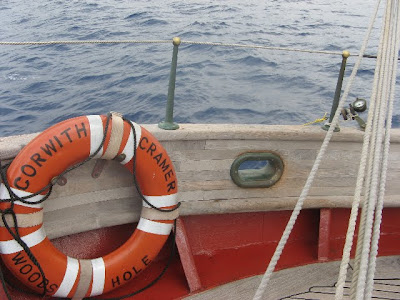****

"How can I help?"
On the first day we were instructed to ask that question often. My first time on a boat about to set sail, I eagerly asked, "How can I help?"
The deckhand Ashley immediately responded, "I need you to grab your harness and be lookout."
I rushed down below deck, gathered my harness from my bunk and ran up to the bow. The boat was just starting to inch its way out of port in St. Croix. Luckily I had studied the plan of Cramer before departing so I knew where the bow was. I waited for Ashley to give me further instructions, my stomach tightening as I regretted what I had unknowingly volunteered for.
Ashley came up next to me and yelled over the sound of the engine, "You have to tell the captain about any buoys or boats you see. If you don't tell Steve we'll crash." Using her arms to signal the relative bearing system she called out DEADAHEADONETWOTHREE BROADONSTARBOARDBOWTHREETWOONE ONSTARBOARDBOW BROADONSTARBOARDQUARTER ONSTARBOARDQUARTER DEADASTERN ANDSAMETHINGFORTHEPORTSIDEOKAY?
The wind roared in my face as I squinted out at the ten green and red buoys bobbing in the water. Dead ahead. Lunging aft to warn Captain Steve, I forgot to unclip my tether and slipped on the deck. When I finally made it to the other side of the 134 foot boat, I hurriedly tested out the new vocabulary words. Tether unclipped in my hand, I raced back to my lookout post. Five more buoys. No, now seven. Ping! Unclip. Ping! Clip. Three white buoys, two sailboats, two red buoys, one green buoy. It began to rain and I blinked away droplets as they whipped my face. I slid on the slick wooden deck as I ran back and forth.
And then there was nothing but the waves battering against the boat and the turquoise horizon dead ahead.
As I unclipped my tether and turned around slowly I noticed the four lowers raised. I had been concentrating so intensely I did not see or hear my shipmates handling the sails behind me.
The other bow watches I have been assigned have been much quieter. Even at different times of the day and night the horizon looks the same--a dark grey sky cutting into a black sea at mid watch, a blue sky blending with a cobalt sea at morning watch, a pink sky illuminating a dark blue sea at dawn watch. Staring at the Atlantic Ocean for an hour or more cannot be compared with any activity done on land; it is a strange juxtaposition of extreme concentration and idle time. I sing as I cautiously turn my head to scan 360 degrees and look for traffic, the noises of the wind and waves drowning out the sound of my voice. And when my shipmate comes to relieve me from my post, I am relieved to report "No traffic ahead".
On the first day we were instructed to ask that question often. My first time on a boat about to set sail, I eagerly asked, "How can I help?"
The deckhand Ashley immediately responded, "I need you to grab your harness and be lookout."
I rushed down below deck, gathered my harness from my bunk and ran up to the bow. The boat was just starting to inch its way out of port in St. Croix. Luckily I had studied the plan of Cramer before departing so I knew where the bow was. I waited for Ashley to give me further instructions, my stomach tightening as I regretted what I had unknowingly volunteered for.
Ashley came up next to me and yelled over the sound of the engine, "You have to tell the captain about any buoys or boats you see. If you don't tell Steve we'll crash." Using her arms to signal the relative bearing system she called out DEADAHEADONETWOTHREE BROADONSTARBOARDBOWTHREETWOONE ONSTARBOARDBOW BROADONSTARBOARDQUARTER ONSTARBOARDQUARTER DEADASTERN ANDSAMETHINGFORTHEPORTSIDEOKAY?
The wind roared in my face as I squinted out at the ten green and red buoys bobbing in the water. Dead ahead. Lunging aft to warn Captain Steve, I forgot to unclip my tether and slipped on the deck. When I finally made it to the other side of the 134 foot boat, I hurriedly tested out the new vocabulary words. Tether unclipped in my hand, I raced back to my lookout post. Five more buoys. No, now seven. Ping! Unclip. Ping! Clip. Three white buoys, two sailboats, two red buoys, one green buoy. It began to rain and I blinked away droplets as they whipped my face. I slid on the slick wooden deck as I ran back and forth.
And then there was nothing but the waves battering against the boat and the turquoise horizon dead ahead.
As I unclipped my tether and turned around slowly I noticed the four lowers raised. I had been concentrating so intensely I did not see or hear my shipmates handling the sails behind me.
The other bow watches I have been assigned have been much quieter. Even at different times of the day and night the horizon looks the same--a dark grey sky cutting into a black sea at mid watch, a blue sky blending with a cobalt sea at morning watch, a pink sky illuminating a dark blue sea at dawn watch. Staring at the Atlantic Ocean for an hour or more cannot be compared with any activity done on land; it is a strange juxtaposition of extreme concentration and idle time. I sing as I cautiously turn my head to scan 360 degrees and look for traffic, the noises of the wind and waves drowning out the sound of my voice. And when my shipmate comes to relieve me from my post, I am relieved to report "No traffic ahead".



